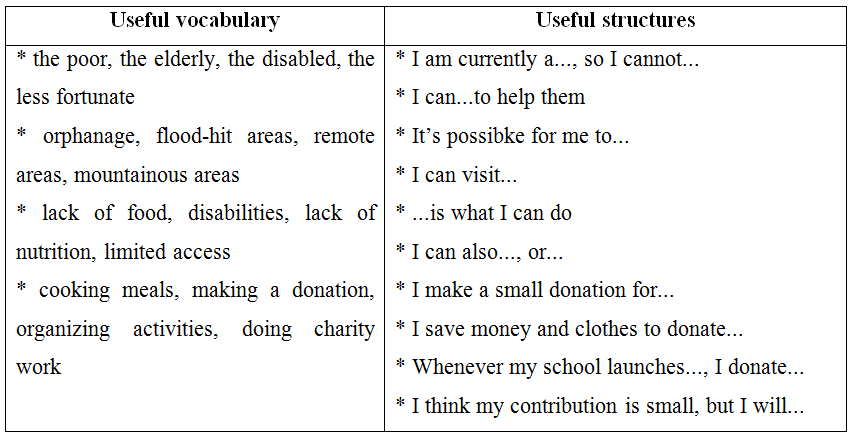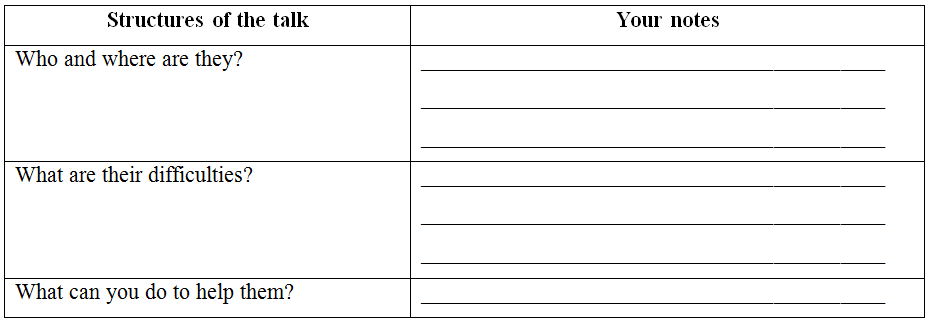6. At our last meeting, we_________to organize an event for the elderly in the neighbourhood.
 Giải bởi Vietjack
Giải bởi Vietjack
Đáp án: B. decided
Giải thích: Trong câu có cụm từ “at our last meeting” (trong cuộc họp trước của chúng tôi) chỉ một mốc thời gian cụ thể trong quá khứ, nên động từ “decide” phải chia ở quá khứ đơn (decided).
Dịch nghĩa: At our last meeting, we decided to organize an event for the elderly in the neighbourhood. (Trong cuộc họp trước của chúng tôi, chúng tôi đã quyết định tổ chức một sự kiện cho người già trong khu phố.)Gói VIP thi online tại VietJack (chỉ 400k/1 năm học), luyện tập gần 1 triệu câu hỏi có đáp án chi tiết
4. It is_________to use words like ‘dumb’, ‘blind’ and ‘deaf’ to the disabled. (RESPECT)
Talk about what you think you can do to help people in need.
You can use the following questions as cues:
* Who and where are they?
* What are their difficulties?
* What can you do to help them?
Useful languages:

Complete the notes:

Now you try!
Give your answer using the following cues. You should speak for 1-2 minutes.
1. I am currently a..., so I cannot...
2. I can...to help them
3. I can visit...
4. I can also..., or...
5. I make a small donation for...
6. Whenever my school launches..., I donate...
7. I think my contribution is small, but I will...
Now you tick!
Did you ...
- answer all the questions in the task?
- give some details to each main point?
- speak slowly and fluently with only some hesitation?
- use vocabulary wide enough to talk about the topic?
- use various sentence structures (simple, compound, complex) accurately?
- pronounce correctly (vowels, consonants, stress, intonation)?
Let’s compare!
Finally, compare with the sample answer on page 190.
3. He_________blind. He became visually impaired after an accident.
4. He began to teach English for disabled children in 2002. (since)
→____________________________________________
1. She has used a wheelchair since her bones (fracture)__________in the car accident last year.
Write an essay (150-180 words) about problems that people living in remote and mountainous areas in your country may face.
* You can use the following questions as cues:
* Who are they?
* What are their problems?
* Why do they have those problems?
__________________________________________________________________
__________________________________________________________________
__________________________________________________________________
__________________________________________________________________
__________________________________________________________________
__________________________________________________________________
__________________________________________________________________
__________________________________________________________________3. This campaign has been launched since 1999. (for 20 years)
→____________________________________________
1. The charity raises a fund of thousands of dollars for the underprivileged so far.
8. He has been a volunteer for Youth Blood Donor Organisation_________.
1. People in my neighborhood have_________more than $400 to the charity.
1. The last time I saw her was 5 years ago. (for)
→____________________________________________
1. This non-profit organisation_________milk for hundreds of children in this remote area.